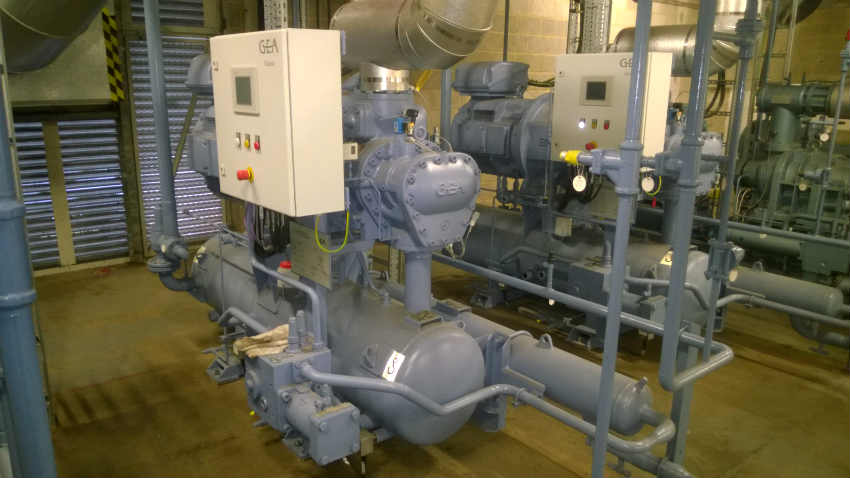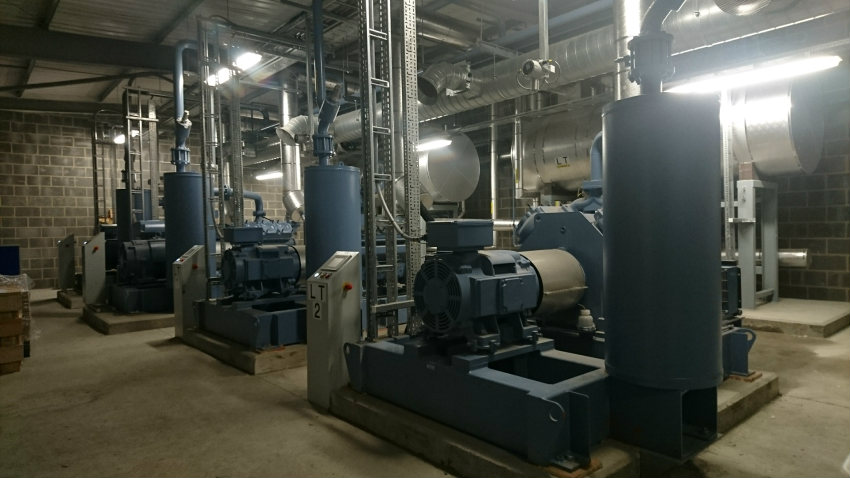05 May 2017
|
| Ed Whinyates of Stonegrove Refrigeration Services outlines the issues to consider before deciding between a reciprocating or screw compressor. It has been said that a compressor is the heart of a refrigeration system, being the only active main component which maintains the flow of refrigerant. So when it comes to selecting the right compressor for a refrigeration or air conditioning application, one of the major discussions has been the choice between screw compressors and reciprocating (recip) compressors. Unfortunately there is not one simple equation to answer this. Screw compressor manufacturers will tell you theirs is the best solution, and recip compressor manufacturers will do the same! |
Compressor choice
When deciding on whether a screw or recip is the right compressor choice, a number of things need to be considered and assessed. These include the type of application, operating conditions, temperature, refrigerant type and future maintenance. Also, capital expenditure will need to be taken into consideration.
Screw compressors
Each compressor type has its advantages (and disadvantages). One view is that screw compressors are a conclusive choice for applications with large refrigeration capacity requirements at low evaporation temperature levels. The capital outlay on screw compressors also tends to be less than recips. The compact design lends itself to a smaller install footprint, and being skid-mounted means no additional foundations are required (avoiding the cost associated with this).
Although a screw compressor will have higher energy consumption in comparison to a recip, this can be reduced on larger applications (from approx. 1200kW), and lower temperature applications. Large Industrial screw compressors tend to have an adjustment device for internal volume ratio. This ensures efficient operation can be kept within a certain range around design conditions.
Screw compressors need to be oil cooled (which isn’t normally required on recips), but you can reclaim the waste oil heat and use it for warming water etc. With this in mind, the cost implication of oil could be lessened by taking advantage of this benefit.
Maintenance on screw compressors tends to cost less and so, due to the precise nature of parts and assembly, can be considered more reliable. However main overhauls involve compressors being sent back to the manufacturer. Disruption is kept to a minimum with factory overhauls, as a direct replacement is provided for any exchange.
It has been argued that there is less possibility of a breakdown with a screw compressor. This is due to the fact it only has two major moving parts that either have contact touch (no friction) or are not in contact with each other, so minimal wear and tear. This in turn means that a screw compressor is suitable for 24hr continuous operation.
Reciprocating compressors
There are a number of benefits for employing a recip compressor, particularly on higher evaporating temperature applications. There is generally a lower energy consumption of up to 15% on smaller duty applications. On part-load applications, recips will outstrip screws on relative energy consumption. They will also automatically adjust to actual evaporating and condensing pressures, which in turn leads to greater energy efficiency. Recips also have lower energy consumption when using high pressure refrigerants (for example CO2).
Recip compressors come into their own when plant does not need run continuously. They are also considered to be extremely reliable in this application, particularly on smaller machines.
Another benefit of a recip over a screw compressor is noise. If noise sensitivity is an issue (for example, business premises in or around residential areas), then a recip would be a better choice as the db level is generally quieter.
Due to the many moving parts on reciprocating compressors, maintenance requirements are more rigorous than on screw compressors, with frequent part replacement (for example suction and discharge valves). However, the maintenance tends to be fairly simple in comparison to screws, without the need for factory overhauls. Also, the additional maintenance costs can be negated by superior energy savings.
In conclusion
It is clear that both screw and recip compressors have their advantages. One could argue that a recip compressor is far more energy efficient, and so the running costs are a lot lower, but a screw compressor is a more cost-effective install with lower maintenance costs.
The reality is that both applications have their place. With guidance from an experienced refrigeration company like Stonegrove Refrigeration Services Ltd, the correct selection to fit the customers’ criteria will be made.
www.stonegroverefrigeration.co.uk
01279 408690
[email protected]
When deciding on whether a screw or recip is the right compressor choice, a number of things need to be considered and assessed. These include the type of application, operating conditions, temperature, refrigerant type and future maintenance. Also, capital expenditure will need to be taken into consideration.
Screw compressors
Each compressor type has its advantages (and disadvantages). One view is that screw compressors are a conclusive choice for applications with large refrigeration capacity requirements at low evaporation temperature levels. The capital outlay on screw compressors also tends to be less than recips. The compact design lends itself to a smaller install footprint, and being skid-mounted means no additional foundations are required (avoiding the cost associated with this).
Although a screw compressor will have higher energy consumption in comparison to a recip, this can be reduced on larger applications (from approx. 1200kW), and lower temperature applications. Large Industrial screw compressors tend to have an adjustment device for internal volume ratio. This ensures efficient operation can be kept within a certain range around design conditions.
Screw compressors need to be oil cooled (which isn’t normally required on recips), but you can reclaim the waste oil heat and use it for warming water etc. With this in mind, the cost implication of oil could be lessened by taking advantage of this benefit.
Maintenance on screw compressors tends to cost less and so, due to the precise nature of parts and assembly, can be considered more reliable. However main overhauls involve compressors being sent back to the manufacturer. Disruption is kept to a minimum with factory overhauls, as a direct replacement is provided for any exchange.
It has been argued that there is less possibility of a breakdown with a screw compressor. This is due to the fact it only has two major moving parts that either have contact touch (no friction) or are not in contact with each other, so minimal wear and tear. This in turn means that a screw compressor is suitable for 24hr continuous operation.
Reciprocating compressors
There are a number of benefits for employing a recip compressor, particularly on higher evaporating temperature applications. There is generally a lower energy consumption of up to 15% on smaller duty applications. On part-load applications, recips will outstrip screws on relative energy consumption. They will also automatically adjust to actual evaporating and condensing pressures, which in turn leads to greater energy efficiency. Recips also have lower energy consumption when using high pressure refrigerants (for example CO2).
Recip compressors come into their own when plant does not need run continuously. They are also considered to be extremely reliable in this application, particularly on smaller machines.
Another benefit of a recip over a screw compressor is noise. If noise sensitivity is an issue (for example, business premises in or around residential areas), then a recip would be a better choice as the db level is generally quieter.
Due to the many moving parts on reciprocating compressors, maintenance requirements are more rigorous than on screw compressors, with frequent part replacement (for example suction and discharge valves). However, the maintenance tends to be fairly simple in comparison to screws, without the need for factory overhauls. Also, the additional maintenance costs can be negated by superior energy savings.
In conclusion
It is clear that both screw and recip compressors have their advantages. One could argue that a recip compressor is far more energy efficient, and so the running costs are a lot lower, but a screw compressor is a more cost-effective install with lower maintenance costs.
The reality is that both applications have their place. With guidance from an experienced refrigeration company like Stonegrove Refrigeration Services Ltd, the correct selection to fit the customers’ criteria will be made.
www.stonegroverefrigeration.co.uk
01279 408690
[email protected]
Content continues after advertisements










